高三英语总复习2词组+语法+练习
- 格式:doc
- 大小:78.00 KB
- 文档页数:9
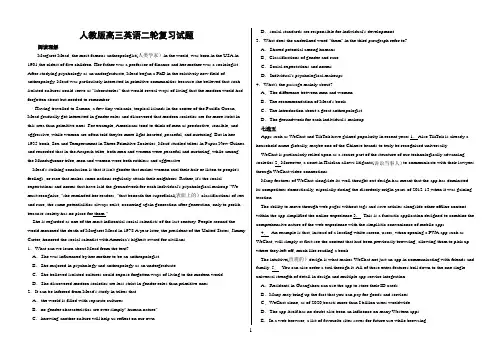
人教版高三英语二轮复习试题阅读理解Margaret Mead, the most famous anthropologist(人类学家)in the world, was born in the USA in 1901,the oldest of five children. Her father was a professor of finance and her mother was a sociologist. After studying psychology as an undergraduate, Mead began a PhD in the relatively new field of anthropology. Mead was particularly interested in primitive communities because she believed that such isolated cultures could serve as "laboratories" that would reveal ways of living that the modern world had forgotten about but needed to remember.Having travelled to Samon, a few tiny volcanic, tropical islands in the center of the Pacific Ocean, Mead gradually got interested in gender roles and discovered that modern societies are far more strict in this area than primitive ones. For example, Americans tend to think of men as productive, sensible, and aggressive, while women are often told they're more light-hearted, peaceful, and nurturing. But in her 1935 book, Sex and Temperament in Three Primitive Societies, Mead studied tribes in Papua New Guinea and recorded that in the Arapesh tribe, both men and women were peaceful and nurturing, while among the Mundugurnor tribe, men and women were both ruthless and aggressive.Mead's striking conclusion is that it isn't gender that makes women curl their hair or listen to people's feelings, or race that makes some nations regularly attack their neighbors. Rather, it's the social expectations and norms that have laid the groundwork for each individual's psychological makeup."We must recognize, "she reminded her readers, "that beneath the superficial(表面上的)classifications of sex and race, the same potentialities always exist, occurring again generation after generation, only to perish because society has no place for them."She is regarded as one of the most influential social scientists of the last century. People around the world mourned the death of Margaret Mead in 1978.A year later, the president of the United States, Jimmy Carter, honored the social scientist with America's highest award for civilians.1.What can we learn about Mead from the text?A.She was influenced by her mother to be an anthropologist.B.She majored in psychology and anthropology as an undergraduate.C.She believed isolated cultures could expose forgotten ways of living to the modern world. D.She discovered modern societies are less strict in gender roles than primitive ones.2.It can be inferred from Mead's study in tribes thatA.the world is filled with separate cultures.B.no gender characteristics are ever simply" human nature".C.knowing another culture will help us reflect on our own.D.social standards are responsible for individual's development.3.What does the underlined word "them" in the third paragraph refer to?A.Shared potential among humans.B.Classifications of gender and race.C.Social expectations and norms.D.Individual's psychological makeups.4.What's the passage mainly about?A.The difference between men and women.B.The recommendation of Mead's book.C.The introduction about a great anthropologist.D.The groundwork for each individual's makeup.七选五Apps such as WeChat and TikTok have gained popularity in recent years.1.Also TikTok is already a household name globally, maybe one of the Chinese brands to truly be recognized universally.WeChat is particularly relied upon as a secure part of the structure of our technologically advancing societies.2.Moreover, a court in Haidian allows litigants(诉讼当事人)to communicate with their lawyers through WeChat video connections.Many features of WeChat alongside its well-thought-out design has meant that the app has dominated its competitors domestically, especially during the disorderly origin years of 2012-13,when it was gaining traction.The ability to move through web pages without tags and save articles alongside other offline content within the app simplified the online experience.3.This is a fantastic application designed to combine the comprehensive nature of the web experience with the simplistic convenience of mobile apps.4.An example is that, instead of a loading white screen, users, when opening a PW A app such as WeChat, will simply at first see the content that had been previously browsing, allowing them to pick up where they left off, much like reading a book.The intuitive(直观的)design is what makes WeChat not just an app in communicating with friends and family. 5.You can also order a taxi through it. All of these extra features boil down to the one single universal strength of detail in design and multiple app service integration.A.Residents in Guangzhou can use the app to store their ID cards.B.Many may bring up the fact that you can pay for goods and services.C.WeChat alone, as of 2020,boasts more than I billion users worldwide.D.The app itself has no doubt also been an influence on many Western apps.E.In a web browser, a list of favourite sites saves for future use while browsing.F.Users didn't have to switch constantly from app to app depending on the type of multimedia they consumed.G.The continuity(连续性)in the online and offline browsing experience makes WeChat successful in keeping our attention on the display of our phones.完形填空When I opened my door this morning, I saw a sign that says, "Good morning, beautiful business."It is a reminder to me of just how beautiful our business can be when we put all our care and energy into it.I 1 the White Dog Cafe in 1983 on the first floor of my house. It is the house I have lived in since I was a child. Today, much of the food 1 2 comes from the same land where my 3 once farmed. Years ago, it was a simple coffee take-away shop serving students who lived nearby. Over the years, we have 4 our menu and grown to 5 five buildings. I owe my success to making decisions not for the purpose of maximizing(使··....最大化) 6 but instead maximizing the 7 with our customers and community. Today I still have the 8 way of doing business-the way it was in the old days with the family farm, the family inn. When I make a 9 ,it comes 10 for my decision to be made in the common interest of all 11 .Business schools teach "grow or die". But I make a conscious decision to continue to be a "small" business 12 I know when we grow in physical size, we would 13 something very important-authentic relationships with the people around us. I have come to realize that we can measure our 14 by measuring how much we improve our knowledge, achieve 15 and deepen our relationships.1.A.opened B.ruined C.visited D.disturbed2.A.request B.manage C.serve D.support3.A.professors B.ancestors C.sponsors D.customers4.A.dragged B.tried C.expanded D.carried5.A.build B.construct C.bury D.occupy6.A.images B.feelings C.opportunities D.profits7.A.relationships B.promises C.experiences D.projects8.A.neat-handed B.short-sighted C.hard-earned D.old-fashioned9.A.decision B.importance C.schedule D.diagram10.A.extremely B.awkwardly C.naturally D.secretly11.A.involved B.invited C.informed D.interested12.A.although B.because C.until D.before13.A.take up B.learn about C.carry out D.give up14.A.lifestyle B.figure C.program D.success15.A.patience B.protection C.happiness D.kindness用单词的适当形式完成短文UK Prime Minister Boris Johnson has started plans for a "cycling and walking revolution". It, if fully 1.(realize),could change the way people move around towns and cities.The move comes as authorities' attempt 2.(improve)public health by arousing people's interest in traveling by bike and on foot. The plans, which are 3.(special)designed for England, are to be funded by £ 2 billion.Wide-ranging in their scope, they include 4.(aspect)such us: providing cycling training to children and adults 5.they want it, developing a network of protected bike routes, and creating "low-traffic neighborhoods."Xavier Brice, the CEO of Sustrans, a charity which focused on cycling and walking, 6.(say)the new plans marked" a big step forward" by the government."By 7.(help)more people to leave the car at home for shorter journeys, this package of measures will cut pollution and improve the safety of our streets," he added.The coronavirus pandemic has already had a significant effect 8.the way people move about. Public transport use in the UK has fallen greatly while some parts of the country 9.(change) their roads lately to make 10.easier for people to get around by walking or by bike.答案:阅读: 1-4 C B A C 七选五: C A F G B完形:1-5: A C B C D 6-10 : D A D A C 11-15: A B D D C语法填空:1.realized 2.to improve 3.specially 4.aspects 5.if/ when6.said 7.helping 8.on 9.have changed 10.it。
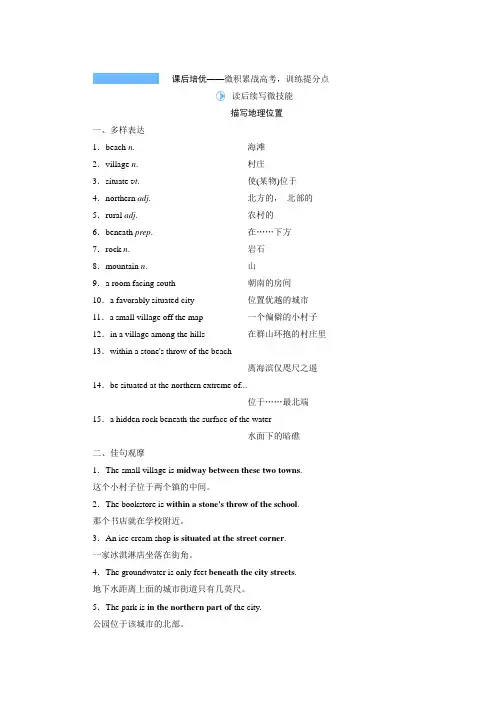
课后培优——微积累战高考,训练提分点读后续写微技能描写地理位置一、多样表达1.beach n.海滩2.village n. 村庄3.situate v t. 使(某物)位于4.northern adj. 北方的,北部的5.rural adj. 农村的6.beneath prep. 在……下方7.rock n. 岩石8.mountain n. 山9.a room facing south 朝南的房间10.a favorably situated city 位置优越的城市11.a small village off the map 一个偏僻的小村子12.in a village among the hills 在群山环抱的村庄里13.within a stone's throw of the beach离海滨仅咫尺之遥14.be situated at the northern extreme of...位于……最北端15.a hidden rock beneath the surface of the water水面下的暗礁二、佳句观摩1.The small village is midway between these two towns.这个小村子位于两个镇的中间。
2.The bookstore is within a stone's throw of the school.那个书店就在学校附近。
3.An ice cream shop is situated at the street corner.一家冰淇淋店坐落在街角。
4.The groundwater is only feet beneath the city streets.地下水距离上面的城市街道只有几英尺。
5.The park is in the northern part of the city.公园位于该城市的北部。
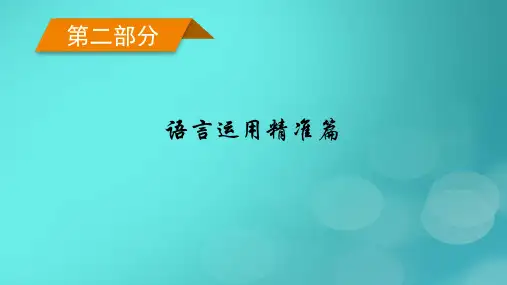
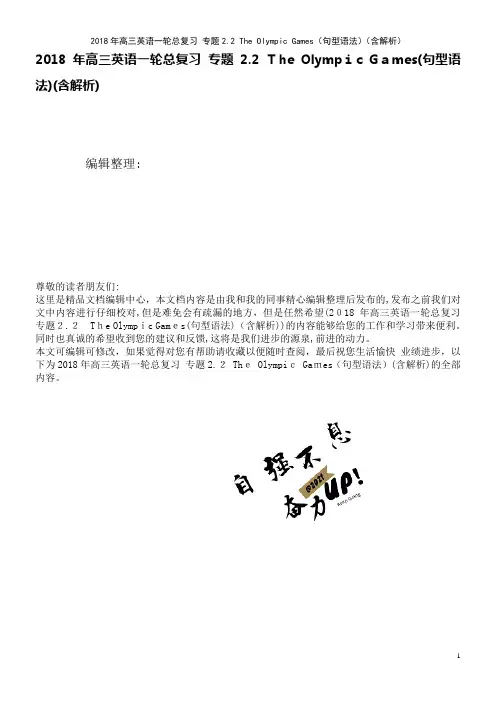
2018年高三英语一轮总复习专题2.2 The Olympic Games(句型语法)(含解析)编辑整理:尊敬的读者朋友们:这里是精品文档编辑中心,本文档内容是由我和我的同事精心编辑整理后发布的,发布之前我们对文中内容进行仔细校对,但是难免会有疏漏的地方,但是任然希望(2018年高三英语一轮总复习专题2.2The Olympic Games(句型语法)(含解析))的内容能够给您的工作和学习带来便利。
同时也真诚的希望收到您的建议和反馈,这将是我们进步的源泉,前进的动力。
本文可编辑可修改,如果觉得对您有帮助请收藏以便随时查阅,最后祝您生活愉快业绩进步,以下为2018年高三英语一轮总复习专题2.2 The Olympic Games(句型语法)(含解析)的全部内容。
专题2。
2 The Olympic Games【学以致用】三、重点句型剖析1. I lived in what you call “Ancient Greece" and I used to write about the Olympic Games a longtime ago。
我生活在你们所说的“古希腊”,并且我曾写过很久以前奥运会的情况。
【要点提炼】(1)此句总体句式是and 连接的并列句。
(2) what you call “Ancient Greece”是由 what引导的宾语从句,做介词 in 的宾语,同时what在宾语从句中做call的间接宾语。
Ancient Greece是宾补.在本句中,what相当于the place that/which.拓展:①what引导的名词性从句除了可以作宾语外,还可以在句中作主语、表语或同位语等。
②what在所引导的名词性从句中充当一定的成分。
③what引导的名词性从句用陈述语序。
They’vedone what they can to help her。
他们已经尽力帮助了她。
He is no longer what he was。
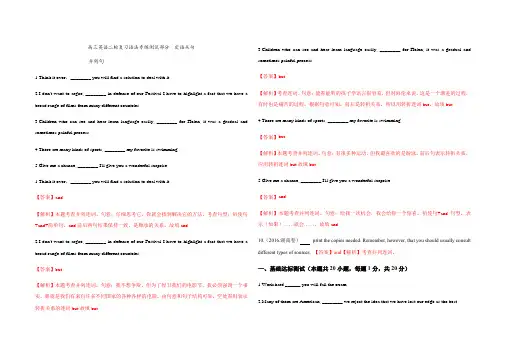
高三英语二轮复习语法专练测试部分---定语从句并列句1.Think it over,________ you will find a solution to deal with it.2.I don't want to argue, ________ in defense of our Festival I have to highlight a fact that we have a broad range of films from many different countries.3.Children who can see and hear learn language easily, ________ for Helen, it was a gradual and sometimes painful process.4.There are many kinds of sports, ________ my favorite is swimming.5.Give me a chance, ________ I'll give you a wonderful surprise.1.Think it over,________ you will find a solution to deal with it.【答案】and【解析】本题考查并列连词。
句意:仔细思考它,你就会找到解决它的方法。
考查句型:祈使句+and+简单句,and前后两句结果保持一致,是顺承的关系。
故填and.2.I don't want to argue, ________ in defense of our Festival I have to highlight a fact that we have a broad range of films from many different countries.【答案】but【解析】本题考查并列连词。
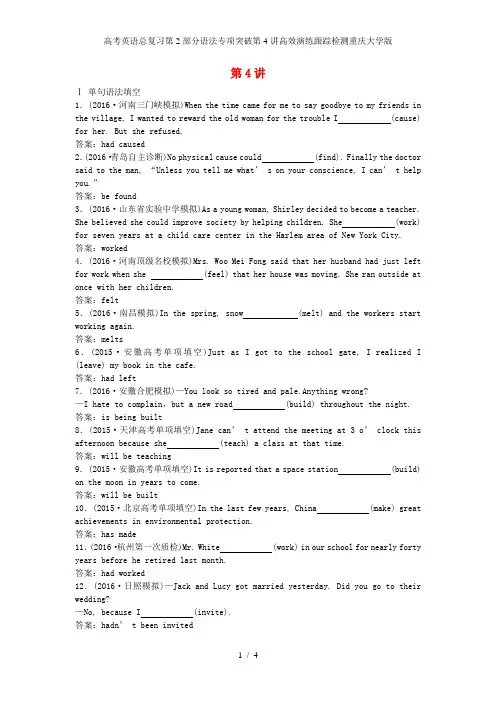
第4讲Ⅰ 单句语法填空1.(2016·河南三门峡模拟)When the time came for me to say goodbye to my friends inthe village, I wanted to reward the old woman for the trouble I (cause)for her. But she refused.答案:had caused2.(2016·青岛自主诊断)No physical cause could (find). Finally the doctorsaid to the man, “Unless you tell me what’ s on your conscience, I can’ t helpyou.”答案:be found3.(2016·山东省实验中学模拟)As a young woman, Shirley decided to become a teacher.She believed she could improve society by helping children. She (work)for seven years at a child care center in the Harlem area of New York City.答案:worked4.(2016·河南顶级名校模拟)Mrs. Woo Mei Fong said that her husband had just leftfor work when she (feel) that her house was moving. She ran outside atonce with her children.答案:felt5.(2016·南昌模拟)In the spring, snow (melt) and the workers startworking again.答案:melts6.(2015·安徽高考单项填空)Just as I got to the school gate, I realized I (leave) my book in the cafe.答案:had left7.(2016·安徽合肥模拟)—You look so tired and pale.Anything wrong?—I hate to complain,but a new road (build) throughout the night.答案:is being built8.(2015·天津高考单项填空)Jane can’ t attend the meeting at 3 o’ clock thisafternoon because she (teach) a class at that time.答案:will be teaching9.(2015·安徽高考单项填空)It is reported that a space station (build)on the moon in years to come.答案:will be built10.(2015·北京高考单项填空)In the last few years, China (make) great achievements in environmental protection.答案:has made11.(2016·杭州第一次质检)Mr. White (work) in our school for nearly fortyyears before he retired last month.答案:had worked12.(2016·日照模拟)—Jack and Lucy got married yesterday. Did you go to theirwedding?—No, because I (invite).答案:hadn’ t been invited13.(2016·南阳一中模拟)Freeflying (base) on the more traditionalskydiving, both of which are eyecatching.答案:is based14.(2016·河南三门峡考前适应性练习)Her mother was excited. “Your father has atlast decided to stop smoking, ” Jane (inform).答案:was informed15.(2016·枣庄模拟)It is reported that his new book (publish) by thatcompany next year.答案:will be publishedⅡ 单句改错1.(2016·南昌调研)Our school conducts a survey on reading last week. According tothe results, most students believe reading is important. conducts→conducted2.(2016·太原五中月考)I have told one more worker will be needed this year and Ithink you are fit for it. How about joining us?have后加been3.(2016·河北邯郸模拟)It has been a long time since we meet in China last time.meet→met4.(2016·杭州二中月考)Every time my father finds me listening to rock music, healways shouted, “Shut it off. It’s awful! ” shouted→shouts5.(2016·青岛高三质检)Yesterday I paid a visit to the Hong’en Temple Park withmy friends. The park was full of fresh and beautiful flowers. When I was enjoyingthe wonderful scenery around, something unpleasant catches my eyes. catches→caught 6.(2016·日照模拟)His progress had been very poor, so one day he stops seeing thedoctor and decided to try a different one. stops→stoppedⅢ语法填空(2016·河南八市重点高中质量监测)Mustafa Kemal Ataturk, the founder of the TurkishRepublic, devoted April 23 to the children of the world to stress that 1. were the future of nation. Since 1920, Turkey 2. (celebrate) April 23as National Sovereignty and Children’s Day. Children’s Day provides 3. unique opportunity to contribute to international peace and solidarity(团结). InDubai over the last four years, 4. the help of the Consulate Generalof the Turkish Republic in Dubai, we have organized four 5. (success)charity celebrations to mark April 23 Children’s Day. Many international schoolsand performance groups of different countries in Dubai took part. We reached anaudience of nearly 4, 000 and the 6. (participate) of more than 50different children performance groups, 7. (include) more than 800children.This year, I am 8. (honor) to announce our fifth celebration happeningtoday. The success of this event lies with the dedicated volunteer work of allorganization 9. (partner) as well as the generous donations of thesponsors. In order to support Dubai Autis m Center’s annual autism(自我中心主义)awareness campaign 10. is organized for the whole month of April, ithas been decided to donate the income of the event to the Dubai Autism Center(DAC).【文章大意】4月23日生活在迪拜的土耳其孩子们庆祝儿童节,这一天孩子们的演出让很多人脸上露出了笑容,给人们带来了欢乐。
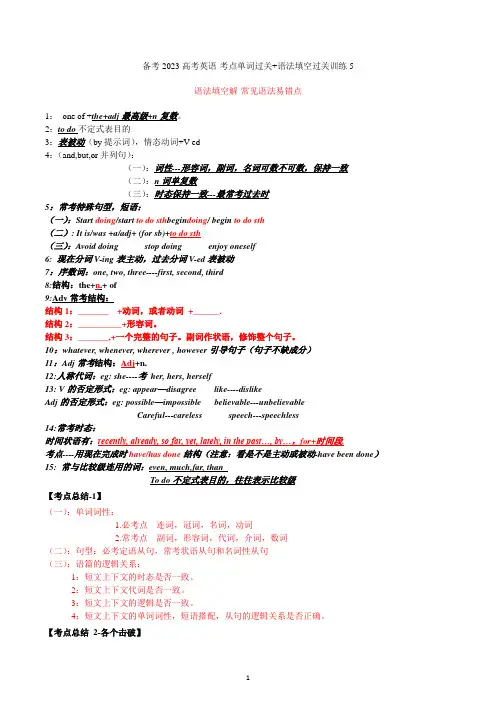
备考2023高考英语-考点单词过关+语法填空过关训练5语法填空解-常见语法易错点1:one of +the+adj最高级+n复数。
2:to do不定式表目的3:表被动(by提示词),情态动词+V-ed4:(and,but,or并列句):(一):词性---形容词,副词,名词可数不可数,保持一致(二):n词单复数(三):时态保持一致---最常考过去时5:常考特殊句型,短语:(一):Start doing/start to do sth begin doing/ begin to do sth(二): It is/was +a/adj+ (for sb)+to do sth(三):Avoid doing stop doing enjoy oneself6: 现在分词V-ing表主动,过去分词V-ed表被动7:序数词:one, two, three----first, second, third8:结构:the+n.+ of9:Adv常考结构:结构1:_______ +动词,或者动词+______.结构2:__________+形容词。
结构3:_______,+一个完整的句子。
副词作状语,修饰整个句子。
10:whatever, whenever, wherever , however引导句子(句子不缺成分)11:Adj常考结构:Adj+n.12:人称代词:eg: she----考her, hers, herself13: V的否定形式:eg: appear—disagree like----dislikeAdj的否定形式:eg: possible—impossible believable---unbelievableCareful---careless speech---speechless14:常考时态:时间状语有:recently, already, so far, yet, lately, in the past…, by…,for+时间段.考点----用现在完成时have/has done结构(注意:看是不是主动或被动-have been done)15: 常与比较级连用的词:even, much,far, thanTo do不定式表目的,往往表示比较级【考点总结-1】(一):单词词性:1.必考点---连词,冠词,名词,动词2.常考点---副词,形容词,代词,介词,数词(二):句型:必考定语从句,常考状语从句和名词性从句(三):语篇的逻辑关系:1:短文上下文的时态是否一致。

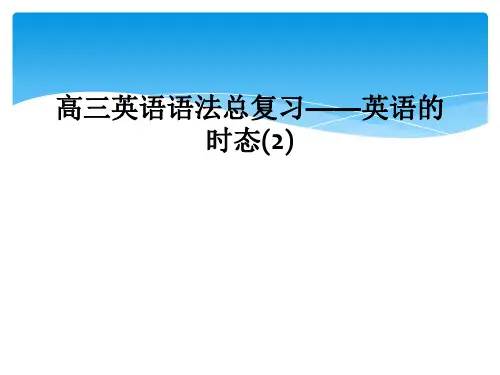
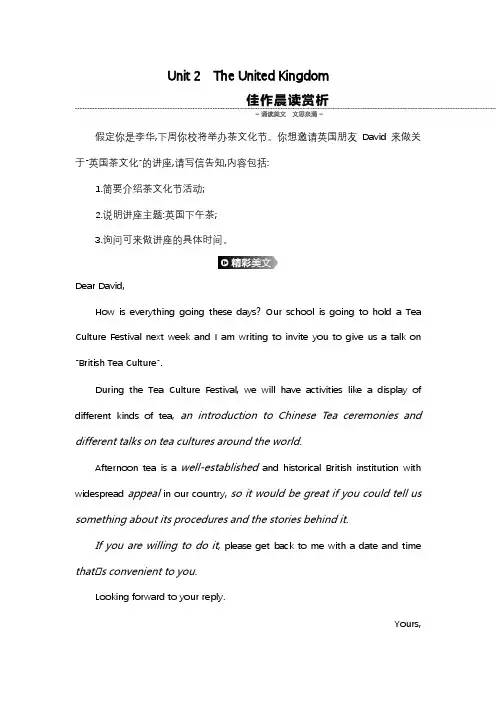
Unit 2 The United Kingdom假定你是李华,下周你校将举办茶文化节。
你想邀请英国朋友David来做关于“英国茶文化”的讲座,请写信告知,内容包括:1.简要介绍茶文化节活动;2.说明讲座主题:英国下午茶;3.询问可来做讲座的具体时间。
Dear David,How is everything going these days?Our school is going to hold a Tea Culture Festival next week and I am writing to invite you to give us a talk on “British Tea Culture”.During the Tea Culture Festival,we will have activities like a display of different kinds of tea,an introduction to Chinese Tea ceremonies and different talks on tea cultures around the world.Afternoon tea is a well-established and historical British institution with widespread appeal in our country,so it would be great if you could tell us something about its procedures and the stories behind it.If you are willing to do it, please get back to me with a date and time that s convenient to you.Looking forward to your reply.Yours,LiHua1.文章体裁:应用文——邀请信。
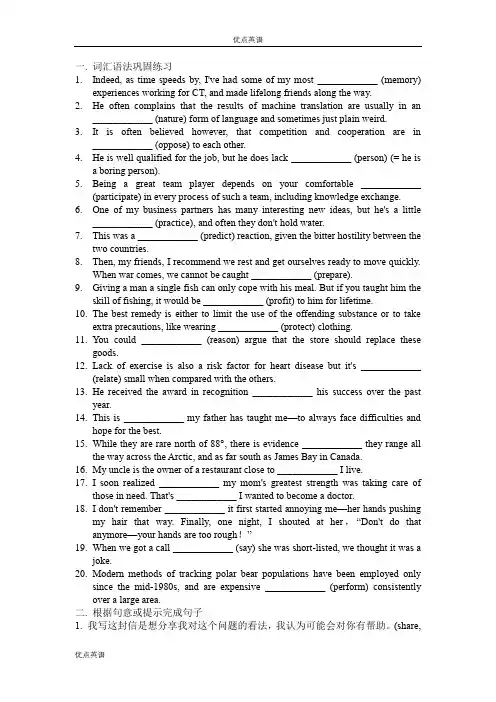
一. 词汇语法巩固练习1.Indeed, as time speeds by, I've had some of my most ____________ (memory)experiences working for CT, and made lifelong friends along the way.2.He often complains that the results of machine translation are usually in an____________ (nature) form of language and sometimes just plain weird.3.It is often believed however, that competition and cooperation are in____________ (oppose) to each other.4.He is well qualified for the job, but he does lack ____________ (person) (= he isa boring person).5.Being a great team player depends on your comfortable ____________(participate) in every process of such a team, including knowledge exchange.6.One of my business partners has many interesting new ideas, but he's a little____________ (practice), and often they don't hold water.7.This was a ____________ (predict) reaction, given the bitter hostility between thetwo countries.8.Then, my friends, I recommend we rest and get ourselves ready to move quickly.When war comes, we cannot be caught ____________ (prepare).9.Giving a man a single fish can only cope with his meal. But if you taught him theskill of fishing, it would be ____________ (profit) to him for lifetime.10.The best remedy is either to limit the use of the offending substance or to takeextra precautions, like wearing ____________ (protect) clothing.11.You could ____________ (reason) argue that the store should replace thesegoods.ck of exercise is also a risk factor for heart disease but it's ____________(relate) small when compared with the others.13.He received the award in recognition ____________ his success over the pastyear.14.This is ____________ my father has taught me—to always face difficulties andhope for the best.15.While they are rare north of 88°, there is evidence ____________ they range allthe way across the Arctic, and as far south as James Bay in Canada.16.My uncle is the owner of a restaurant close to ____________ I live.17.I soon realized ____________ my mom's greatest strength was taking care ofthose in need. That's ____________ I wanted to become a doctor.18.I don't remember ____________ it first started annoying me—her hands pushingmy hair that way. Finally, one night, I shouted at her,“Don't do that anymore—your hands are too rough!”19.When we got a call ____________ (say) she was shortlisted, we thought it was ajoke.20.Modern methods of tracking polar bear populations have been employed onlysince the mid1980s, and are expensive ____________ (perform) consistently over a large area.二. 根据句意或提示完成句子1. 我写这封信是想分享我对这个问题的看法,我认为可能会对你有帮助。
高考外刊语法填空2第一篇It is one of the defining attributes of being human: when 1 (compare) with our closest primate relatives, we have incredibly large brains.Now scientists 2(shed)light on the reasons for the difference by collecting cells from humans, chimps and gorillas and turning them into lumps of brain in the laboratory.Tests on the tiny” brain organoids reveal a hitherto unknown molecular switch that 3(control) brain growth and makes the human organ three times larger than brains in the great apes.Tinker 4the switch and human brain loses its growth advantage, while great ape brain can be made to grow more like that in the human.“5we see is a difference in cellular behavior very, very early on that 6 (allow) the human brain to grow larger,” said Dr Madeleine Lancaster of the Medical Research Councils Laboratory of Molecular Biology in Cambridge.” We are able to account for almost all of the size difference.”The healthy human brain typically reaches about 1,500cc in adulthood, roughly three times the size of the gorilla brain, at 500cc, 7the chimp brain at 400cc.But working out why has been difficult, not least because 8____(develop) human and great ape brains cannot easily be studied.Lancaster and her colleagues collected cells, often left over from medical tests or operations, 9humans, gorillas and chimps, and reprogrammed them into stem cells. They then grew these cells, in a study published in Cell, encouraging them to turn into brain organoids--little lumps of brain tissue a few millimetres wide.Weeks later, the human brain organoids were by far the largest, and close examination revealed 10. In human brain tissue, so-called neural progenitor cells--which go on to make all of the cells in the brain--divided more than those in great ape brain tissue.Mathematical modelling showed the difference happens so early on in brain development that it leads to a near doubling in the number of neurons in the adult human cerebral cortex compared with in great apes.Key pared2.have shed(shed light on固定搭配,意为:阐明,使…清楚地显出)3.controls4.with 固定搭配5.What 主语从句6.allows7.and8.developing9.from10.whyWord bank: attribute v把…归因于n.属性;标志Organoid n.细胞团,类器官early on在早期;从事,经营第二篇Something exotic happened to me the other day. I got dressed in heels and a midnight-blue silk shirt, and left the house to go somewhere. I 1(teach) my first in-person class in nearly a year.I am in an unfamiliar classroom, 2the university moved our small seminar to a large sterile room to allow for social distancing. Instead of being around one big table with coffee cups and granola bar wrappers crinkling, we sit at desks 3(space) at an unnatural distance. Some of the details of our Covid-era ambience might be objectively off-putting: the masks, a giant tub of unusually rubbery and unpleasant hand sanitizer, a huge screen projecting one student 4Zoom from a pink room.Yet I feel a little like I have walked into the greatest party of my life. I feel in an instant what is lost over Zoom: the sense of being together in the same space, working 5out.How do you pin down the indescribable energy in the room? We are talking about Virginia Woolf. A quiet student talks. The jumping in is natural. Conversation stirs. You 6feel people thinking.Something mysterious happens. It is physical. It is an energy you can fake or aspire to but never actually have in a Zoom class. You can cover your material. You can make an interesting point. But the feeling of a live class can never 7(reproduce), and the effort of trying or hoping for it exhausts you, depresses you and diminishes you in tiny but cumulative ways.8 a Zoom class I always thought, “Now that wasn’t so terrible.” I was too relieved at the okayness, the perfectly adequate effort at continuity, to fully allow myself to investigate or inhabit the lack. The feeling 9Zoom is “fine” entailed a surrender to the barest bones of education, a terrible settling.In the book we are discussing, “A Room of One’s Own,” Virginia Woolf writes of the “profound, subtle and subterranean glow, which is the rich yellow flame of rational intercourse. No need to hurry. No need to sparkle. No need to be anybody but oneself.”Pauses are important. They 10(fill) with information. I cannot feel that on screen. Pauses are blank on screen, and because they are blank I fill them right away and there aren’t any.But in the classroom, I can feel when it is time to push farther into an idea. I can feel which students have something to say. I have not understand how much of teaching takes place outside of words. I can feel when it is time to elaborate a point, take a break, switch modes.Key 1.was teaching2.because3.spaced4.over5.something6.can7.be reproduced8.After9.that10.are filledWord bank:diminish v.减弱in an instant 瞬间,马上pin down 确定;阻止第三篇The pandemic summons memories of a childhood illess and a reminder of the wondrous challenges of parenting .I spent my fourth birthday in the Children’s Hospital of Philadelphia. I remember they had two cakes 1another sick child---his name was Bruce, and he was turning 7---had the same birthday. One cake was frosted half blue, half pink, the other all yellow.I’m guessing that I actually liked hearing the word” encephalitis “ over and over as the big people around me said it to each other in the days and nights 2my 1957 birthday; it has a cool percussive sound. In a small room with blue light, they 3(put) a lot of glue or something in my hair, and there had been a machine with lots of squiddy arms with button ends, which they attached to my head. I was frightened. My mother tried to explain it to me, but they needed her to be quiet.She couldn’t be there all the time; my two older sisters and my baby sister at home needed her too. And I remember my co-birthday friend Bruce 4(look) out for me, putting his arm around me, reassuring me, distracting me.There are those who, 5this kind of early experience of illness and hospitals, would go into medicine. I’m not one of them. I have a friend who is oddly grateful for the pandemic because, had his family not been isolated at home last April, his 11-year-old daughter would 6(die). Samantha had been reading in her room; her father had been in a virtual meeting downstairs. Her sister had come running, yelling that something was really wrong with Sam. Her dad sprinted to find her in a violent seizure, eyes rolled back; a silent abnormality in her brain had sparked a sudden calamity. Rushed to Yale New Haven Hospital and into impossibly complex and skillful surgery, she is now alive and well, with part of her skull 7(replace) by a 3-D printed piece. She is determined to be a pediatric brain surgeon. She’ll be good at it.Looking back at my 40-8years of making cards and books and music and such, it seems I’ve been determined to do in my own life what 7-year-old Bruce so kindly did for me: offer lively, distracting reassurance. I’ve been contriving a benevolent world for my child-self, and for other unsettled children.But in this past unpredictable year, seeing so many essential workers steadily doing their essential work, I’ve felt some uneasiness about being, essentially, non-essential. Nevertheless, I’ve been hyper-productive, if for no more noble reason than preserving my own sanity. (“I don’t have time to think about mortality! I have a ‘Find the Hidden Cows’ jigsaw puzzle to draw!”) I’ve worried sometimes 9maybe my quixotic, upbeat art has the wrong tone these days. But there was nothing else I wanted to do.Then, out of the blue, I got this message from a valued, worried friend:” We often read《Night-Night, Little Pookie》at bedtime, and I think every time about what it means to get my trusting little miracle girl off to bed when it’s not ‘gentle winds blowing’ above her, but a bitter and frightening gale.”This startled me, and offered a kind of illumination as to the “Why do it?” of things. Picturing this gentle, protective father with his miracle daughter, I see and remember what parents do, and 10 wondrous and difficult that can be, and how important it is . This is why we make birthday cakes, and light the candles.Key 1.because2.before3.had put4.looking5.with6.have died7.replaced8.whatever9.that10.howWord bank:sprint n.冲刺v.冲刺contrive v.谋划,设计第四篇A year ago, Aaron Gordon supposed it was all over for his restaurant under tight restrictions in Washington, DC. The city had ordered restaurants to close for eat-in dining. 1 a surge in orders for takeout and delivery soon pushed his takings back up. Sensing an opportunity he searched for a site to launch a takeout and delivery-only business. Ghostline DC, a vast kitchen 2space for six business to cook and box up food, is still going strong, he says, even as the city begins to let restaurants reopen.Covid-19 has been calamitous for many restaurants across America, as elsewhere. But for some it 3(present) an opportunity. Just as the pandemic has speeded up a trend in retail towards online sales, so has it hastened the rise of “ghost restaurants”, which offer food but no tables to eat it at. Uber Eats says it now has more than 10,000 delivery-only restaurants 4its platform in America, up from 3,000 in 2019.Big restaurant groups 5(launch) delivery-only operations. In February, Applebee’s launched Cosmic Wings, one of several chains with delivery-only chicken wings. Denny’s, another national chain, is launching two virtual brands from its kitchens.But smaller, independent outfits have been the nimblest. When the owners ofEspita, a high-end restaurant serving Oaxacan food in Washington, 6(realise) that survival depended on takeout but that much of its fare, from ceviche to tacos, did not travel well, it started a side-hustle in burgers. “We hoped it 7(allow) us to keep on our staff,” says Josh Phillips, a co-owner. Ghostburger now makes nearly as much as the core business did before the pandemic.Steve Salis is about to open a takeout and delivery-only food hall in Bethesda, with kitchen space for several of his restaurant business. He hopes Ensemble, 8it will be called, will show how such models allow brands to set up outposts in new areas.The delivery-only model has its drawbacks. Restauranteurs routinely use the word “hate” when they talk about the third-party delivery apps 9they depend to reach customers. Though some cities, including Washington, imposed limits on the fees such apps could charge restaurants during the pandemic, they take a chunk of the savings restaurants make by going virtual. Because drivers stack orders in one geographical area together, to maximise efficiency, restaurants have to assume each other will sit in a car for an hour before it reaches the customer.And the delivery model tends to miss out on lucrative alcohol sales. Americans love the convenience of ordering food. But the pandemic 10(remind)many that they can mix a cocktail perfectly well, and a lot more cheaply, at home.Key 1.But2.with3.has presented4.on5.are launching6.realised7.would allow8.as9. upon which10. has remindedWord bank:maximise v.把…增加到最大限度calamitous adj.灾难的,悲惨的hasten v.促进stack n.一堆v.使成整齐的一堆第五篇That throbbing headache just won’t go away and your mind is racing about what might be wrong. It turns out googling your symptoms may not be as ill-advised 1once thought.2some doctors advise against turning to the internet before making the trudge up the clinic, a new study suggests that researching symptoms online may not be harmful after all, 3could lead to modest improvements in diagnosis.Using “Dr Google” is controversial, with fears that it can lead to inaccurate diagnoses, bad advice 4where to seek treatment, and increased anxiety.Previous research into the subject 5(limit) to observational studies of internet search behavior, so researchers from Harvard sought to empirically measure the association of an internet search with diagnosis, triage, and anxiety by presenting 5,000 people in the US with a series of symptoms and 6(ask) them to imagine someone close to them was experiencing the symptoms.The participants were made up of roughly equal numbers of men and women with 7average age of 45. They were asked to provide a diagnosis based on the given information, which ranged from mild to severe, and described common illnesses such as viruses, heart attacks and stroke. Then , they looked up their case symptoms on the internet and again offered a diagnosis. Participants also 8(ask) to select a triage level, ranging from “let the health issue get better on its own” to calling emergency services, and to record their anxiety levels.The results showed a sharp increase in diagnosis accuracy, which was 49.8% 9____ the search and rose to 54% after the search . However, there was no difference in triage accuracy, or anxiety, the authors wrote in the journal JAMA Network Open.About three-quarters of the study participants were able to identify the severity of a situation, and appropriately choose when to seek care.The lead author, Dr David Levine, of the Boston-based Brigham and Women’s hospital and Harvard medical school, added that people with prior health experience, including women, older adults and those with poor reported quality of life were” hands-down” better at diagnosis.He said the findings suggested that medical experts and policymakers probably did not need to steer patients away from the internet when it came to seeking health information and self-diagnosis or triage. Instead, using the internet was likely to help patients figure out what was wrong.“We did not observe the often-touted ‘cyberchondria’. That is, after search, folks were not more anxious and heading to the emergency room for care. Many physicians believe that using the internet to search for one’s symptoms is a bad idea and this provides some evidence that is unlikely the case,” he said. “Searchers for the most part did not use poor sources of information such as that forums or social media. This similarly refutes the idea that folks who search the internet are obtaining’ bad advice’ from poor data sources.”Marcantonio Spada, an academic psychologist at London South Bank University who has researched cyberchondria, said the study highlighted the benefits of internet searching when confronted with health symptoms.” The question remains as to how much interest searching is ‘enough ’ to reach the goal of understanding 10the health symptom is about. The absence of a ‘stop signal’ to internet searching may spell the risk for the development of cyberchondriac behavior. Future studies should consider this.”Key 1.as2.Although3.and4.on5. has been limited6.asking7.an8.were asked9. before10.whatWord bank:controversial adj.有争议的often-touted 被吹捧。
一. 教学内容:语法复习(二)简单句、并列句和复合句1)陈述句(肯、否):He is six years old; She didn’t hear of you before.2)疑问句(普通、特殊、选择、反意):Do they like skating? How old is he? Is he six or seven years old? Mary can swim, can’t she?3)祈使句:Be careful, boys; Don’t talk in class4)感叹句: How clever the boy is!1)简单句:惟独一个主语(或者并列主语)和一个谓语(或者并列谓语)。
e. g. He often reads English in the morning.Tom and Mike are American boys.She likes drawing and often draws pictures for the wall newspapers.2) 并列句:由并列连词(and, but, or)或者分号(; )把两个或者两个以上的简单句连在一起构成。
e. g. You help him and he helps you.The future is bright; the road is tortuous. 前途是的,道路是蜿蜒的。
3)复合句:含有一个或者一个以上从句的句子。
复合句包含:名词性从句(主语从句、宾语从句、表语从句和同位语从句)、语从句和状语从句。
e. g. The foreign visitors took a lot of pictures when they were at the Great Wall.1、主语+系动词+表语: e. g. He is a student.2、主语+不及物动词: e. g. We work.3、主语+及物动词+宾语: e. g. Henry bought a dictionary.4、主语+及物动词+双宾语(间接宾语+直接宾语):e. g. My father bought me a car.5、主语+及物动词+复合宾语(宾语+宾补):e. g. Tom made the baby laugh.注:其他各种句子都可由这一种基本句型扩展、变化或者省略而构成。
一、词汇语法巩固练习1.I'll let you borrow my car __________ one condition that you lend me your bicyclein return.2.You can be paid __________ cash weekly or __________ cheque monthly; thoseare the two alternatives.3.In 2004, he started Dodgeball, another check-in service, which Google bought__________ a few million dollars and later shut down.4.Afterwards, he built dozens of single wooden rooms for the travellers to rent__________ the price of $3 per night by the roadside.5.When Sunday came, and it was time for the girl to start on her way, she becamefrightened, although she __________ (she) did not know exactly why.6.I knew that this wasn't the first time I __________ (let) such an opportunity passme by, and that made everything even more difficult.7.__________ a lot of hard work and a touch of luck play a part, perseverance is thekey to success.8.Both men had hardly had time to realize what was happening __________ theywere thrown violently into the sea.9.My grandpa, __________ is often the case with old people, is fond of __________(talk) about the good old days.10.My parents are the most important for me, without __________ support, I wouldn’thave reached that far.11.He is going to spend the Spring Festival in Nanjing, __________ live hisgrandparents and some relatives.12.Li Ziqi, the Chinese internet celebrity, is famous for her videos __________ sheperforms the work of a farmer with the grace of a fairy.13.By 16:30, __________ was almost closing time, nearly all the paintings had beensold.14.The most exciting moment during the Spring Festival is __________ the familyenjoy the big dinner together.15.The impact and ultimate result depend on __________ you do with the difficultiesthat you have.16.__________ bothers me is that I can’t keep my mind on the task, but on personalgains or losses.17.The father and his son got lost in the mountain and they had to eat __________food they could find there.18.Young women seem to perform worse than men on high-level math tests. That is__________ has confused the educators for ages.19.After being designated as the first special economic zone in China, __________was once a fishing village has rapidly become an emerging modern city.20.A warm thought suddenly came to me __________ I might use the pocket moneyto buy some flowers for my mother’s birthday.21.The Chinese Ministry of Agriculture finds that between 2005 — __________ thegovernment started a soil-testing program __________ gives specific fertilizerrecommendations to farmers — __________ 2011, fertilizer use dropped by 7.7 million tons.22.As more and more people own private cars, parking has become __________ bigheadache for many car owners, especially for those __________ live in downtown areas without enough __________ (park) spaces.23.When he saw the mists __________ (rise) from the river and the soft clouds__________ (surround) the mountain tops, he __________ (reduce) to tears.24.While visiting Hangzhou’s West Lake and its __________ (surround) beautifulhills, you’ll understand __________ it’s been a great source of __________ (inspire) for artists, poets and __________ (philosophy) throughout Chinese history.25.When I took the money from her grandparents, I looked back at the girl,__________ was giving me the most __________ (optimism) smile I had ever seen.All __________a sudden, her handicap was __________ (go) and all I saw was this beautiful girl, whose smile just melted me and almost instantly gave me a completely new sense of __________ life is all about.二、七选五Including children in the farming lifestyle has many benefits. Sure, it is nice to have the additional help with chores (家庭杂物), but it also fosters so much growth, sending our kids down a good path towards who they will someday become. It is possible that our children will grow up to lead lives that do not include farming. ______1______Through caring for farm animals, kids learn that in life others often come before self. ______2______ It doesn’t matter if we don’t feel like it or if we are sick and tired. What matters is that we take care of the animals that take care of us and do so in a timely manner.______3______ If the work on a farm does not get done, the operation fails. It takes discipline and commitment to get down to business every day, and seeing this in action will give kids a good work attitude. They will know and understand that nothing good comes easy and that they have to work to survive. ______4______ Functioning as part of a productive team will surely be playing a crucial role sooner or later in all walks of life.Additionally, farming teaches patience. ______5______ Cattle will be difficult to control. Horses will run away when you try to catch them. Goats will kick over that bucket of hard-earned milk. A rooster will decide you got too close to his hens and give you a run for your money. In spite of all that, kids will learn to be patient and take things easy.There may not be any instant reward, but in the long term kids will see the benefit of all their efforts during those hard days.A. At the same time, they learn to work with others.B. Farm life also teaches kids the value of hard work.C. Children learn to be grateful for animals for eating purpose.D. Teamwork is no longer an important skill to develop and use.E. There are going to be a lot of days when things do not go your way.F. However, what they learn on a farm can also be instrumental in their future lives.G. Animals need to be fed, watered, and cared for before we get to sit down and relax.三、完形填空When I was a child, I always wanted to be a superhero. I wanted to ____1____ the world and then make everyone happy. But I knew that I’d need superpower to make my dreams come true. When I grew up and realized that science fiction was not a good source for ____2____, I decided to go on a journey of ____3____ science, to find a more useful truth.I started my journey in California with a UCBerkeley 30-year study that examined the photos of students in some old yearbooks and tried to ____4____ their success and wellbeing throughout their life. I ____5____ a celebrity’s picture. When I first saw his picture, I thought that these superpowers came from his super collar. But now I know it was all in his ____6____.Smiling stimulates our brain reward mechanism in a way that even chocolate—a well-regarded pleasure inducer—cannot ____7____. British researchers found that one smile can produce the same ____8____ of brain stimulation as up to 2,000 bars of chocolate. The same study found that smiling is as stimulating as ____9____ up to 16,000 pounds in cash. That’s like 25 thousand dollars a smile. It’s not bad.And, unlike lots of chocolate, lots of smiling can actually make you____10____.Smiling can help reduce the level of stress-enhancing hormones, increase the level of ____11____ hormones and reduce overall blood pressure.So whenever you want to look great and competent, reduce your ____12____ or feel as if you just had a whole stack of high-quality chocolate—without worrying about the caloric ____13____—or as if you found 25 thousand dollars in a pocket of an old jacket you hadn’t ____14____ for ages, or whenever you want to tap into a superpower that will help you and everyone ____15____ you live a longer, healthier, happier life, smile.1. A. occupy B. conquer C. save D. beautify2. A. superpower B. supernature C. superman D. superhero3. A. fake B. natural C. complicated D. real4. A. achieve B. examine C. make D. measure5. A. came across B. came out C. came over D. came up6. A. picture B. smile C. dream D. yearbook7. A. adopt B. award C. match D. stand8. A. number B. piece C. scale D. level9. A. receiving B. rewarding C. repeating D. recording10. A. happier B. healthier C. heavier D. hungrier11. A. self-enhancing B. skill-enhancingC. mood-enhancingD. strength-enhancing12. A. weight B. stress C. pleasure D. satisfaction13. A. lost B. requirement C. consumption D. cost14. A. fixed B. worn C. met D. known15. A. except B. besides C. around D. without四、语法填空Agricultural experts say crop diversity is important to feed the (1)____________ (increase) population of our planet. They say having a large variety of plants also (2) ____________ (help) to protect against possible crop diseases and future crises. But many experts say the number has decreased sharply during the past century.One of the world’s largest seed (3) ____________ (conserve) projects has predicted further losses. The Millennium Seed Bank Partnership is warning that up to one hundred thousand plant species could (4) ____________ (permanent) disappear. The rich collection of genes (5) ____________ decide their qualities would disappear with them.Many experts blame climate change and loss of habitat, normal growth area, (6) ____________ damaging plant life. They say human activities and poorly planned, overly heavy use of land also are responsible. Modern business farming is responsible for loss of farmers’ traditional crop (7) ____________ (various). The “Green Revolution” of the (8) ____________ (twenty) century changed agriculture. Some experts say the use of modern commercial farming methods saved millions of people from starvation. Farmers planted, watered, and fertilized their crops with the help of machines. They treated their fields with chemicals (9) ____________ (control) diseases and insects. Harvests grew larger and of higher quality, (10) ____________another result was that some traditional crops were lost. Damage to the environment over the past century makes people believe that crop diversity also suffered.一、1-5 on; in, by; for; at; herself6-10 had let; Although/Though/While; when; as, talking; whose11-15 where; where; which; when; what16-20 What; whatever; what; what; that21. when’ which/that, and22. a, who, parking23. rising, surrounding, was reduced24. surrounding, why, inspiration, philosophers25. who, optimistic, of, gone, what二、FGBAE三、CADDA BCDAB CBDBC四、1. increasing2. helps3. conservation4. permanently5. that/which6. for7. varieties8. twentieth9. to control10. but。
语鹅市安置阳光实验学校专题十形容词与副词考点1 形容词与副词的语境辨析1.I’m so________to all those volunteers because they helped my terrible day end happily.(2015·安徽,26)A.special B.superiorC.grateful D.attractive2.They gave money to the old people’s home either________or through their companies.(2015·安徽,31)A.legally B.sincerelyC.personally D.deliberately3.It was ________ of Michael to inform us of his delay in case we got worried.(2015·福建,23)A.careless B.considerateC.patient D.generous4.Most of us,if we know even a little about where our food comes from,understand that every bite put into our mouths was ________alive.(2015·浙江,13)A.steadily B.instantlyC.formerly D.permanently5.Listening is thus an active,not a ________,behavior consisting of hearing,understand ing and remembering.(2015·浙江,14)A.considerate B.sensitiveC.reliable D.passive6.The police officers decided to conduct a thorough and ________ review of the case.(2015·江苏,31)A.comprehensive B.complicatedC.conscious D.crucial考点归纳解决词义辨析题的关键是牢记某些高频词的词义,掌握词义的有效办法就是通过语境去记忆,通过背诵句子来记忆词汇的音、形、义。
M1U21.turn up 调高;出现turn down 调低,拒绝2.waste …on sth / in doing sth 浪费…在…上/浪费…做某事a waste of time/ money 浪费时间/金钱3.force sb to do sth / force sb into doing sth 强迫某人做某事4.the summer vacation/ holidays 暑假on vacation/ on holiday 在假期中5.than expected/ as expected 比期望的…/ 如期望的一样6.enter the room 进入knock the door before you enter 进入(discussion) enter the third week进入enter the data into the computer 键入enter (sb) for the competition 报名参加比赛7.can‘t wait to do sth 迫不及待地做某事8.…followed by three students 被三个学生跟着…following three students 跟着三个学生9.be supposed to do sth 应该做某事10.bend – bent – bentbend down 俯身,屈身bend over 弯腰,弯在…上方be bent on sth/ doing sth 专心做某事,投入地做某事bend to/ before sb 向某人屈服11.be gone 丢了,不见了;用完了;离开了;(时间)过去了Gone are the days when……的日子一去不复返了12.do with (与what连用) 处理,对付deal with (与how连用)处理,对付13.(in)a mess乱七八糟What a mess! 真是乱极了!14.leave + 宾语+宾补(adj/ adv/ 介词短语/ v-ing/ done)让…处于…状态中leave the door open 让门开着leave him alone 让某人单独留下leave him at home/ leave sb in charge 让他在家/让某人负责leave the water running/ leave sb waiting 让水一直流淌/让某人一直等待leave the work unfinished 工作未完成leave sth behind 遗忘…leave out 遗漏leave aside 搁置,不考虑15.sb in charge of sth 负责…sth in the charge of sb 由某人负责in/ under the charge of sb = in/ under sb‘s charge 由某人负责take charge of 负责类似用法的动词还有control/ possession16.the reason why/ for which后接定语从句,且先行词在定语从句中作状语的成分the reason that/ which 后接定语从句,且先行词在定语从句中作主语,表语或宾语the reason for sth …理由the cause of…for some/ no reason 因为某种原因/ 毫无理由,无缘无故17.go unpunished/ unchecked/ unnoticed 未被惩罚/未被检查/未被注意到go bad/ hungry/ wrong/ mad 变坏/挨饿/出差错/变疯18.find fault with …挑某人的错at fault 有错It‘s my fault. 是我的错19.go out 灯熄灭;出去;过时20.have one‘s arms crossed 手臂交叉have sth done 1) 使某事被做2) 经历或遭遇…have your hair cut/ have the radio repaired 请别人剪头发/请别人修收音机have his legs broken/ have my wallet stolen 腿断了/ 钱包被偷了have sb do sth 让某人做某事have sb doing 让某人一直做have sth to do 有某事要做21.go mad 发疯drive sb mad 驱使某人疯狂be mad at sth/ with sb对…发疯的22.deserve sth/ deserve to do sth 应受到…应得到…deserve praise/ deserve to be praised 应受到表扬23.be hard on sb 对某人苛刻的be cruel/ rude to sb 对某人残忍的/粗鲁的be good/ kind/ polite to sb 对某人好的/善良的/有礼貌的be patient/ strict/ angry with sb 对某人有耐心的/严格的/生气的be particular about 对…挑剔的24.Now that 放于句首,引导原因状语从句,“既然”25.punish sb for sth/ doing sth 因为…而惩罚某人thank/ praise/ encourage/ forgive sb for sth 因…而感谢/表扬/鼓励/原谅某人26.should not have done/ should have done 本不应该做的却做了/ 本该做的却没做27.run out of sth / sth run out 用光,耗尽28.act like a guide 行为举止像…act as 扮演…的角色29.treat sb as/ like …把…当作…,看作…treat sb to ice cream 请某人吃冰激凌treat sb for 治疗某人的…病30.make good decisions 作出良好的决定31.make a mistake 犯错误32.pay in cash 以现金支付pay by cheque 以支票支付33.be proud of = take pride in 对…感到骄傲的pride oneself on 以…为自豪34.stay up (deep/ late) into the night 熬夜,晚睡35.be/ feel nervous about 对…感到紧张的be worried/ anxious about 对…担心的,焦虑的36.fail (in) the exam 考试不过合格fail to do sth / fail in doing sth 做某事没成功,失败了Words failed sb. 无法用语言表达be beyond sb.(his name) escape sb.37.be/ feel upset with sb 对某人感到不开心的make sb upset 使某人不高兴be/ feel upset over/ about sth 对…感到不高兴的upset sb with sth 用…使某人不高兴38.for nothing 白费的,徒劳的;免费地=for free;无缘无故地39.after all (置于句首)毕竟;(置于句末)终究;above all尤为重要的是;first of all首先;in all总共;all over the world全世界;all the time一直,始终;all the best 万事如意;at all (否定句)根本,全部;all but差不多,几乎;all the way一路上;all the same仍然40.mix up 弄乱mix A with B 把A和B弄混淆了41.ask sb for advice 向某人征求意见follow/ take/ act on one‘s advice 听从某人的建议advise sb to do sth / advise doing sth 建议某人做某事/建议做某事advise that-clause (shoud) 建议…42.stop to do sth / stop doing sth 停下来去做某事/ 停止做某事go on to do sth/ go on doing sth 继续做另一件事/继续做同一件事mean to do sth/ mean doing sth 打算做某事/意味着…can‘t help (to) do sth/ can‘t help doing sth 不能帮忙做某事/情不自禁做某事try to do sth/ try doing sth 努力做某事/尝试做某事43.keep doing sth 一直做某事keep on doing sth 强调动作的反复性,中间有间隔keep sb from doing sth = stop/ prevent sb (from) doing sth 阻止某人做某事44.get sth done = have sth done 使某事被做get sb to do sth = have sb do sth 让某人做某事get sb/ sth doing …使…动起来45.make a/ no difference to…对…有影响/没有影响46.argue – argument argue with sb about/ over sth 与某人就…而争论47.think of/ consider/ regard/ treat sb as…把…认为是…,看作是…48.fix a problem 解决fix the watch 修理fix the picture on the wall 安装,固定fix the time for the meeting 确定fix one‘s eyes/ attention on …集中49.a 16-year-old boy 一个16岁的小男孩50.at the moment 目前,此刻;那时;in a moment 马上,很快;after a moment 过了一会儿for a moment 片刻,一会儿;for the moment 目前,暂时;at any moment 在任何时候,随时The moment…一…就…引导时间状语从句51.as though/ if 似乎,好像It looks as though/if it is going to rain. 与事实相符,用陈述语气He acted as though/ if nothing had happened.与事实相反,用虚拟语气从句是“主语+be动词”结构,可省略主语和be动词,直接跟名词短语,不定式,或现在分词,过去分词He acts as though/ if (he were) a fool.The man stopped as though/ if (he were) to see whether he was followed.He sat in the room as though/ if (he were) reading.He fell down from the horse as though/ if (he were) shot.52.insist on doing sth 坚持做某事insist that-clause 1) insist表示坚持认为,不用虚拟语气2)insist表示坚持主张,坚持要求,则用虚拟语气,should+V53.at present 目前54.prevent sb (from) doing sth 阻止某人做某事55.allow sb to do sth/ allow doing sth 允许某人做某事/允许做某事allow sb sth (allow him his freedom) 允许给予某人某物allow for 体谅,考虑到56.suggest sth to sb 向某人建议…suggest doing sth 建议做某事suggest that-clause 1) 表示暗示,表明,不用虚拟语气2)表示建议,则用虚拟语气,should+V57.fight with sb 与某人打架,斗争fight for/ against …为争取…而斗争/为反对…而斗争58.like crazy 发疯似地59.in one‘s spare time 在空余时间里a spare ticket 一张多余的票a spare tyre 备用轮胎spare sb some time 为某人匀出世间60.Every time/ Each time/ Next time/ The first time/ Last time…引导时间状语从句,每次/每次/下一次/第一次/上次…The moment/ minute/ second…一…就…61.forbid-- forbade—forbiddenforbid doing sth 禁止做某事forbid sb to do sth/ forbid sb from doing sth 禁止某人做某事ban/ prohibit/ discourage/ prevent/ keep/ block sb from doing sth 阻止某人做某事62.辨析scene/ view/ sight/ sceneryScene指局部的,单个的自然风景;还可指场景,布景,或者指现场View强调从高处或远处俯视或领略到的景色Sight指一些名胜古迹,尤指人工制成的景色Scenery主要指一个国家或一个地区的整体的自然风景完形填空解题技巧解题四步法原则:第一步:跳读。